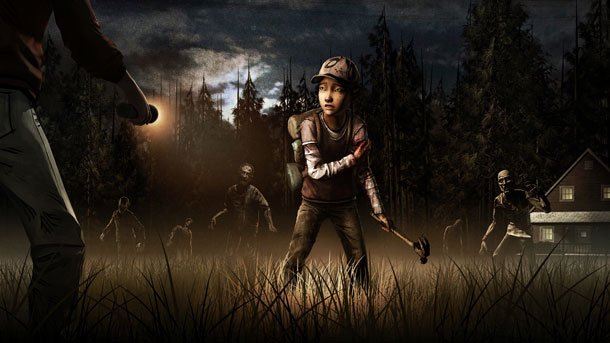
Written by Stefanie Fogel
The Walking Dead Season Two is almost here. Telltale's Dennis Lenart, director of the Season Two premiere, and writer/season designer Mark Darin recently spoke to us about the series and its new pre-teen protagonist, fan-favorite Clementine.
PC Gamer: Child protagonists are not all that common in video games. Why did you guys decide to make Clementine the lead for season two?
Mark Darin, writer/designer, Telltale Games: I think choosing Clementine as a protagonist let us really experiment in the way that the gameplay plays out. It lets you experience--like you said, child protagonists are not generally used that often--but it provides us a unique perspective on a world that you've already seen. You spent a lot of Season One playing as Lee bringing up Clementine in a way that you think is going to be best for her. Now, putting you in her shoes and seeing how that plays out, that's something that really resonated with us.
For me, one of the things that is really special about it is that she is not special. She's just a little girl dealing in this world of paranoid and intense people with zombies running around, and she has only herself to get through it. She isn't special. She's not running around with guns. She doesn't have any magic powers. She's just doing everything she can to survive, as any one of us would.
Clem's a normal child, but she did learn how to shoot in Season One. So, are we going to see some of that same kind of action gameplay in Season Two, and how is that going to work with a child character?
Dennis Lenart, director, Telltale Games: You're going to see action sequences at the start of the game, but it's not the same as Lee was. Lee was a full-grown man. The way he deals with people and the way he deals with zombies is very, very different from Clementine. She can shoot a gun, but she's not running around the world with a bunch of guns just taking out zombies right and left. She's got to use her environment. She's got to use everything she has to her advantage. So, the way we're approaching action sequences in Season Two is a little bit different. It's focused on her vulnerabilities and the different strengths that she has, which is very, very different from what Lee brought to Season One.
The biggest gaming news, reviews and hardware deals
Keep up to date with the most important stories and the best deals, as picked by the PC Gamer team.
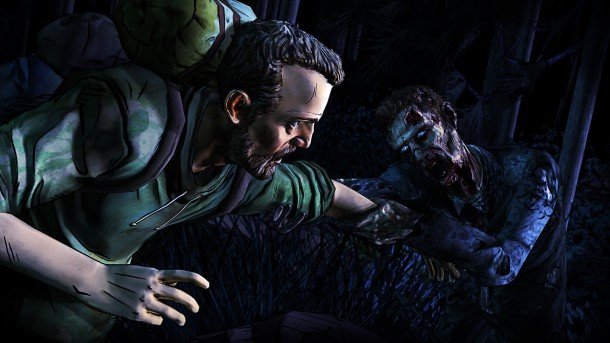
Does that mean Season Two will include more puzzles?
Lenart: Not necessarily, no.
Darin: I think a lot of Clementine's biggest struggles are not going to come from the action sequences, but it's going to come from the ways the world treats her, and the way you
have to interact with people, and that space that you have as a young girl dealing with new people that you're meeting. How do they trust you? Do you trust them? What level of manipulation is going on, and how do you perceive those things? These are all the really dramatic and intense things that are going to be happening across the season.
Writing believable and interesting child characters can be a bit of a challenge. We've even seen this in AMC's The Walking Dead show with Carl in Season Two, who was not exactly a favorite amongst viewers. How are you guys approaching that challenge with Clementine?
Darin: A lot of shows and games fall into the pitfall of using a child character's inexperience to cause problems, and that makes you not like the character at all, because they're just causing problems. We try to be mindful of that when we're writing our stories, and that's one of the things I think that made Clementine not a hated character in Season One, made her a beloved character. She was not just causing problems through her inexperience, and we're carrying that through Season Two as well.
How much time has passed between the final scene of Season One and Season Two? Where is Clementine when we catch up with her again?
Lenart: That would be a spoiler. We're trying to leave some stuff for the excitement of playing the game for the first time. She's still not a teenager, we'll say that.
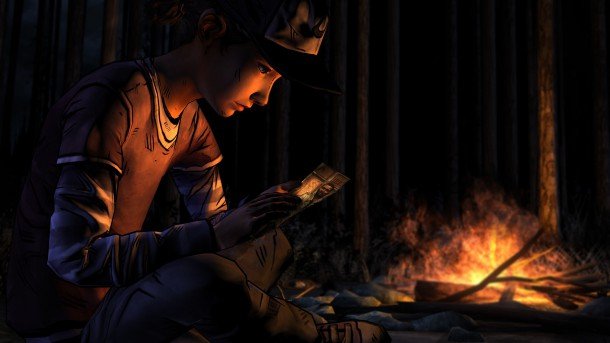
The Walking Dead is known for its tough moral choices. In Season One, it was an adult making them. Now, you have this child who could potentially decide who lives and who dies, or who might have to chop somebody's leg off with an axe to save them from the walkers. How is that going to work with Clem, and how will that affect her character?
Lenart: Well, one of the really interesting things you touch upon there is that in Season One, a lot of times, people made good decisions with Clementine around, based on wanting to show her this is how the world is. “You need to learn how to survive,” or “You don't need to see this, I'm trying to keep you, retain a sense of your humanity as much as possible.” There's things you can do that she didn't know about, but now … you're the one who's going to be making Clementine have to go through these terrible times and make these tough decisions. So, there's a lot more of the feeling of ownership, but also, at the same time, I think it really puts you in an interesting head space, where you really feel like the world is just all hits, pressing down around you. It's “The Walking Dead,” so no one's safe at any time. You know that everything you do has repercussions. So, I think the fact that it is Clementine that you're playing as, it makes every little thing a lot harder.
How will some of the choices players made in Season One affect Clementine?
Darin: Basically, we're always looking for little places to call back to things. The choices you made in Season One and the things you did with Clementine color who she is in Season Two. That's an important thing for us. We're trying not to be super heavy-handed with it, but we're really retaining that sense of feeling like the Clementine you helped raise in Season One, this is the logical progression of that arc that you went through with her.
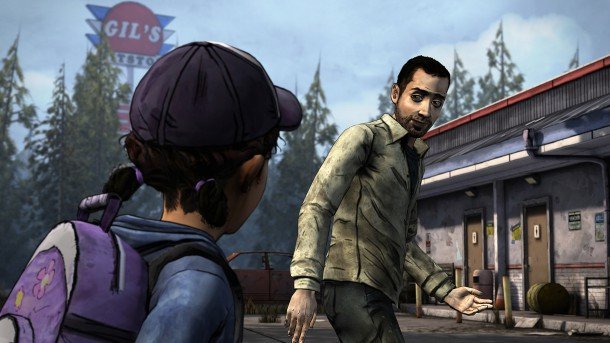
Earlier this week, you guys teased a screenshot of Omid from Season One. What role does he play in Clementine's life at this point?
Lenart: That would be probably spoiler territory, actually.
What about the 400 Days DLC? How does that figure into everything?
Lenart: We did make the promise that 400 Days, and Season One, those choices are going to carry over. A thing that happens in both Season One and in 400 Days, those events, those choices that you made, they will figure into the story in possibly unexpected ways.
How much of Clementine's success as a character do you credit to Melissa Hutchinson and her performance?
Lenart: She's awesome, so a lot of it. Definitely. Melissa's performance is fantastic. She brings this innocence to [Clementine] and this need to want to protect her as well, and her performance--she's an amazing actress.
It's funny. I feel like even in the booth with her recording lines, you feel oddly protective of her as she's recording. It's really weird to be able to, you're sitting there focusing on a line, and you hear Clementine, and you just want to save her. Then you look over and it's Melissa sitting there with headphones. “Oh, yeah, everything's fine.”
Darin: I try not to look at her in the booth. It's just weird. You're sitting there looking at your paper, looking at the script and hearing the line, but you're picturing Clementine in the other room. You look up and it's Melissa. She's so good.
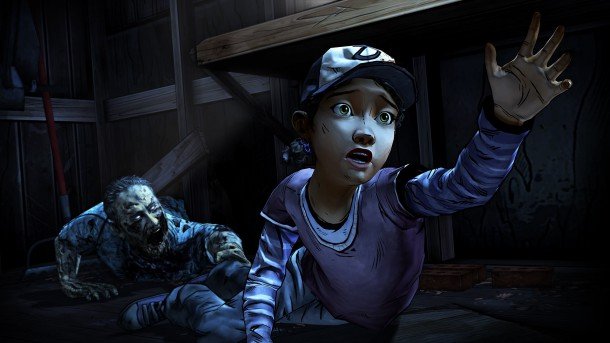
When you made the decision to cast Clementine as the playable character, were you at all concerned about how it'd be received by an audience that's used to playing beefy space Marines and sexy adventurers?
Lenart: Not at all. For me, that was the draw to it, and so maybe it's not as much of a concern. To me, it was more excitement, I guess.
Darin: It's great being in the creative world, that you can jump into and have these meaningful relationships with characters and enjoy that and still be able to, when you're done with this episode, go back and shoot some aliens and have fun with that. There's so many different kinds of games, and you don't have to be limited to one kind. You don't need to stereotype people and say, “This is what gamers want, they just want to run around and shoot things.” They want a perspective. There's room for all these kind of games to exist, and people want to play a variety of things and they're offering that to people.
I think part of the core of this whole game, too, is making her the opposite of a space Marine. So, she doesn't have different guns. She doesn't have special powers. She's not super-oddly strong for a young girl. We really try to make you feel like you are a young girl in the zombie apocalypse, and you have all the same limitations that she would have. I think that's what we're really excited about with Season Two. It's a challenge that you get personally involved in. That's what makes it fun to play, is you put yourself into unique situations and you have to make the decisions, and you have to try to roleplay them in a variety of different ways. That's what's fun about it.
Thanks, guys.
PC Gamer is the global authority on PC games—starting in 1993 with the magazine, and then in 2010 with this website you're currently reading. We have writers across the US, Canada, UK and Australia, who you can read about here.


